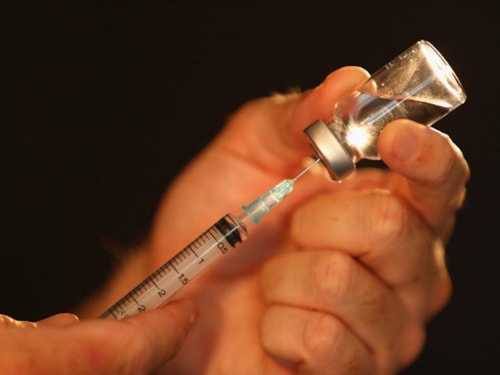Research on male contraceptive pill stopped due to side effects
The male contraceptive injection has been linked to depression, mood swings and increased sex drive.
A male birth control injection won’t be on the market anytime soon, even if it does work. The Journal of Clinical Endocrinology & Metabolism reports that it has many of the same side effects as the female birth control pill.
 |
| Photo: newschannel5.com. |
According to US News, from 2008 to 2012, in a study funded by the United Nations, 320 men aged 18-45 were injected with 1,000 mg of testosterone and 200 mg of norethisterone enanthate, also known as progestin. These injections were given for 24 consecutive weeks to prevent the body from producing its own testosterone and limit sperm count. After that, they had normal sex an average of twice a week, using a combination of non-hormonal contraceptive methods.
By the end of 2011, 266 volunteers had completed 24 weeks of injections, and four had gotten their partners pregnant. This put the effectiveness of the male injectable contraceptive at about 96%. However, the authors decided to stop the project early “for safety reasons.”
“The risks outweigh the potential benefits,” the report in The Journal of Clinical Endocrinology & Metabolism found. In total, 1,491 adverse events were reported in the volunteers, including pain at the injection site, muscle pain, increased libido, acne, mood changes, and depression.
Furthermore, after 52 weeks of stopping the injections, eight volunteers did not regain their fertility, although the average recovery time was 26 weeks. Continuing to monitor these people, scientists discovered that sperm counts only returned to normal after a very long time. One case has not fully recovered to this day.
Some scientists were upset that the study was halted because the side effects were so similar to those women experience with hormonal birth control. “Twenty to 30 percent of women taking birth control pills become depressed enough to need intervention, and they ended the study because 3 percent of men got sick,” Elisabeth Lloyd, a biology professor at Indiana University, told CNN. Notably, nearly 39 percent of the side effects were unrelated to the injectable.
Urologist Seth Cohen at New York University Langone Medical Center expressed concern about hormonal birth control methods, but hoped that experts would continue to work to find a drug that is safe for both men and women.
According to VNE
| RELATED NEWS |
|---|


